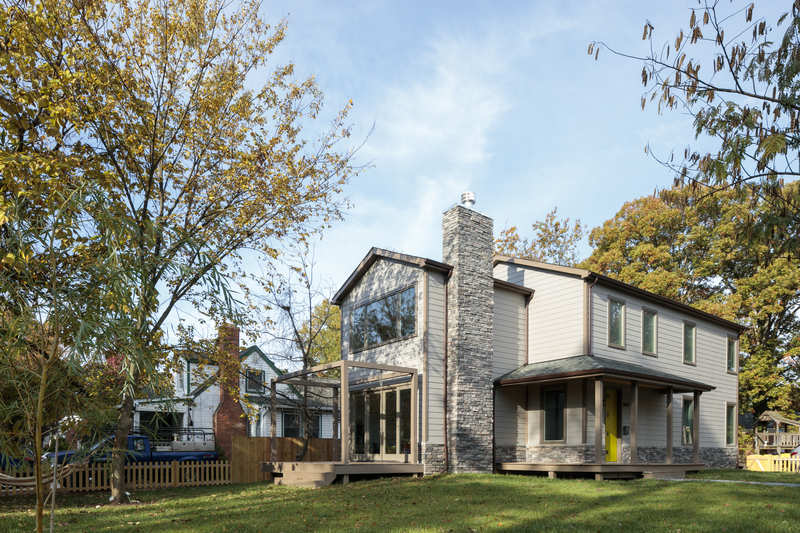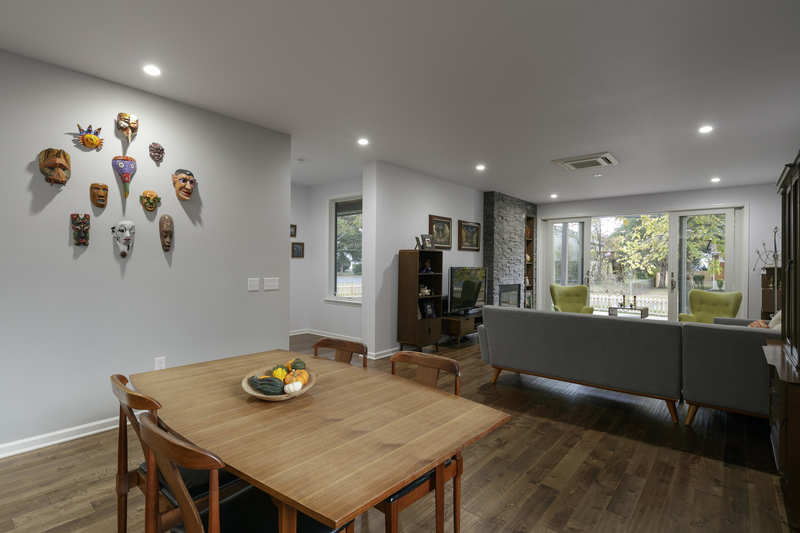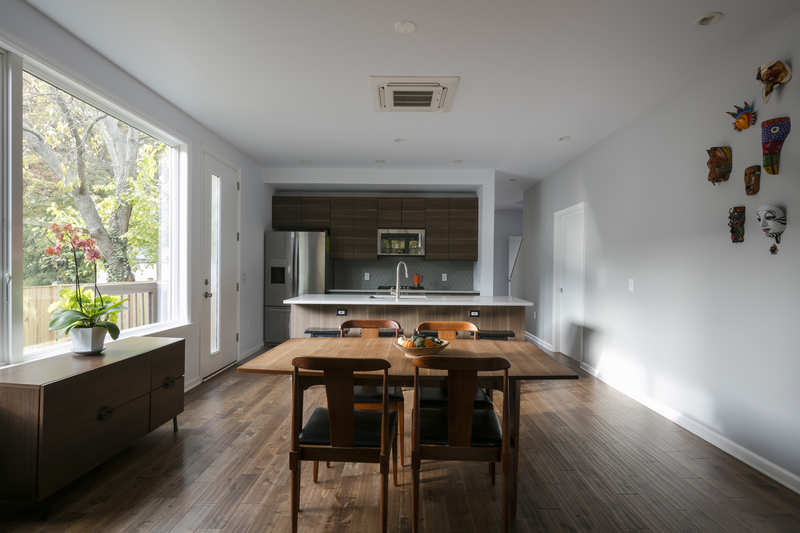All Forum Posts by: Eric Teran
Eric Teran has started 9 posts and replied 305 times.
 Post: Abandoned, Tax Delinquent Property in DC
Post: Abandoned, Tax Delinquent Property in DC
- Architect
- Alexandria, VA
- Posts 316
- Votes 369
@Rachan Malhotra for DC you can go to www.propertyquest.dc.gov and www.pivs.dcra.dc.gov. You can also go to the city tax assessor website and find out more information there. With that said I don’t know if it list the next of kin if the property has never been officially transferred over.
DC does not like these houses that are left vacant. If it is considered blighted they want these turned around quickly. I would call The tax assessor office and tell them that you are interested in purchasing the property. They may help you.
 Post: Abandoned, Tax Delinquent Property in DC
Post: Abandoned, Tax Delinquent Property in DC
- Architect
- Alexandria, VA
- Posts 316
- Votes 369
@Rachan Malhotra be persistent. There are a lot of properties like this in DC but developers usually get there first. I am sure these people have received some sort of yellow letter to sell the house but don’t let that stop you.
Do what @Greg Dickerson suggested. If you find out there location I would even swing by and knock on their door.
I lost out on a property down the street from me by not being persistent. I wrote two letters in a year and the owners lived a mile from me. I thought about knocking on their door and never did. About a year after I first saw the property they put it up for sale and by then it was over my budget to make my numbers work.
Good luck.
 Post: Vacant Lot & New Construction - How would you do it?
Post: Vacant Lot & New Construction - How would you do it?
- Architect
- Alexandria, VA
- Posts 316
- Votes 369
@Christopher Cammiso part two of my response. You will have to get a loan only for the lot. Banks consider these risky investments because there is nothing of value on the lot. There are not a lot of banks that do these.
Once you pull a permit you can get a construction to permanent loan. These are more available and you can shop around. Most likely you land loan will be rolled into the construction to permanent loan. The down payment on the land counts towards the down payment of the construction loan. These loans are usually 80% LTV but you can find 90% LTV. Try local banks first and call around. I called over 30 banks before I finally found one when I built my house.
 Post: Vacant Lot & New Construction - How would you do it?
Post: Vacant Lot & New Construction - How would you do it?
- Architect
- Alexandria, VA
- Posts 316
- Votes 369
@Christopher Cammiso I would do a lot more research on what may be built. I once found a great vacant lot in front of a river but found out it need the counties approval even though it was a build able lot. I called all the council members and three of them gave me a flat out no. I then had a neighborhood meeting and out of the 20 people that showed up 18 opposed my idea. Long story short if it requires public approval you are in for a fight.
Trying to get multiple variances is very complicated and time consuming. Variances allow for public opinion and if you do not have the neighbors, planning/zoning departments, and local politician supporting you then you have an uphill battle.
Have you figured out all the setbacks, lot occupancy, green area ratio, FAR, easements, etc.? I guess the variances may resolve some of these issues but there might be one you overlook. For example, if it borders a Greenbelt a setback might be bigger than a normal setback.
If this property is in Long Beach I think your construction cost is low. Especially if you have to install all the utilities.
I don’t want to be the one given you bad news but I have tried similar projects and I’m an Architect with 20 years of experience.
This is what I suggest you do.
1. find out who would be voting on this variance and call them to get a feeling for their thoughts on these types of developments.
2. Find out if there are neighborhood meetings and go to one explaining your intent. You want to know if they will support you. Always keep them in the loop.
3. Make an offer with it being contingent on you getting a building permit. Ask for a year to go through the process.
4. The seller will not like this idea but you can offer him something called, “right to first refusal.” I think that is what it is called. Let’s say you offer him $60k and need a year to pull the permit. The property can remain on the market and If someone within that time offers them $80k you can match that price and continue your process or he can sell it to that party. I know two developers that have done this successfully. There might be more to it though.
This scenario may cost you money but you won’t have a completely useless property if you can’t pull the permit with all the variances.
Good luck.
 Post: Surprise development opportunity!
Post: Surprise development opportunity!
- Architect
- Alexandria, VA
- Posts 316
- Votes 369
@Matt Ridenour I recommend you start with an Architect. Not because I am one but this is what we do. Think of the Architect like the quarterback of the team. You will need lots of players but the Architects coordinates them.
If you are not 100% sure what can be built you can hire an Architect to perform a feasibility study. You can also do this yourself if you have time and don’t mind asking the city departments what is allowed to be built.
For example, even though you are allowed 4 units you may need to meet other requirements such as lot occupancy, setbacks, FAR, green area ratio, storm water management, easements, and so on. Either you or an Architect can perform this.
Once you know what may be built then you may hire the Architect (it might be a different one) to design a plan and do all the coordination.
You will most likely need the following consultants; structural engineer, MEP engineer, and civil engineer. There are many more but you may not need them in your jurisdiction.
One last thing, when building a new structure the more information you have on the plans the more precise bids you will obtain. You will save money in construction cost if you pay more upfront during the design phase.
Good luck and feel free to ask follow up questions.
 Post: Should I build a prefab house for passive house?
Post: Should I build a prefab house for passive house?
- Architect
- Alexandria, VA
- Posts 316
- Votes 369
@Sam Martin I have been an Architect for over 20 years and I have seen the same with site built projects. I agree that some modular companies are horrible. Actually, a few of them went bankrupt in 2016 when I was looking to build my house. Just like looking for a Contractor the same care should be taken when looking for a modular company.
Modular construction is approved by a third party agency from the state. Sometimes the local jurisdiction has stricter codes than the state. That is a case by case basis. On-site inspection by the local jurisdiction is not performed on the modular portion. They only inspect the portion that were built on-site like the foundation.
When my house arrived there was no need to repair anything. Only tie the units together and bolt them down to the foundation. I have had no issues. The good thing about building modular is that it is all built inside a factory. Stick build is open to the elements. I have one project right now where the GC is not good and is going very slow. It rained this week and he now has to replace a lot of wood due to the damage.
In the end you get what you paid for weather it be stick built or modular.
 Post: Should I build a prefab house for passive house?
Post: Should I build a prefab house for passive house?
- Architect
- Alexandria, VA
- Posts 316
- Votes 369
@Greg Dickerson I agree that manufactured/mobile carries a stigma as those are not attached to a foundation. However, a modular house is. I believe it is a matter that most modular homes are ugly and basic with cheaper materials and that is what affects the appraisal.
I built my modular house in Northern Virginia in 2017 and since then it has been appraised twice. Once when I was looking for a HELOC and another to refinance. Both times the appraisal had no issue with it being a modular house. They actually never asked. The city has also had no problem appraising the house for much more than it was two years ago for real estate taxes. When I show people my house they never imagine it is a modular house because it doesn't look like one. I believe this is where modular gets a bad reputation because a lot of the designs are basic, boring, and bad. I believe the fact that it is a modular house does not lower the resale or appraisal. It is a bad design, cheap materials, or an unkempt house that lowers resale and appraisals.
Here are some photos.



This is why I have been harping in my last few modular posts across the forum to start your design process with modular in mind. If you try to jam a typical design into modular it may not work and then it may become a bad design which would lead to a lower resale.
 Post: Should I build a prefab house for passive house?
Post: Should I build a prefab house for passive house?
- Architect
- Alexandria, VA
- Posts 316
- Votes 369
@Basanta Khanal I forgot to mention the loans. Most likely you will have to get a loan for the land. Once you have plans ready a bank will give you a construction to permanent loan. Usually they give you around a year for the construction with a higher interest rate. Once the home is completed it rolls into a typical permanent loan at a lower rate with no additional closing cost.
A prefab manufacturer may have an option to help with the construction to permanent loan but not for the land. I looked in Northern Virginia and called over 30 banks and none of them offered a loan that encompassed all three. Only two banks offered both types of loans but they were completely separate loans with closing costs. A bank doesn’t like to hold onto land because usually there is not much value to it until a structure is built. I hope that helps.
 Post: Should I build a prefab house for passive house?
Post: Should I build a prefab house for passive house?
- Architect
- Alexandria, VA
- Posts 316
- Votes 369
@Basanta Khanal i have to disagree with @Greg Dickerson on some of his points.
1. A modular house does not look or feel any different than a stick built house. Once it is complete no one will ever be able to tell how the house was built.
2. A modular house is appraised the same way as a stick built house. The appraiser cares about the location, size, bedrooms, bathrooms, fireplaces, heating/cooling and so on but they do not care how it was built. Wood studs are wood studs.
3. The resale value does not depend if it is modular. A modular house will not lower the price. Once again it is impossible to tell if a home was built with modular methods unless floors and walls are ripped apart. Technically a modular house is stronger as there are more studs to support the structure during transportation.
4. Modular will save you money but you have to start the design process with modular requirements and get as much of it built in the factory as possible. If you do any type of design and then try to make that work with modular dimensions then the cost savings are diminished.
5. If you don’t save that much money you will definitely save time and time is money.
Good luck.
 Post: I have a good problem and need advice!
Post: I have a good problem and need advice!
- Architect
- Alexandria, VA
- Posts 316
- Votes 369
@Ashley Boyd I am going to tell you a story that I learned from a billionaire about 15 years ago. I worked at an architecture firm in Southern California and this client was a developer who flipped million dollar homes. He would buy a property around $5 million, invest another $2 million and sell it over $10 million. This would be done within a year. His philosophy before buying any property was to have his selling price set. If anyone at anytime after he bought the property offered him this price or higher he would sell and move onto the next flip. Even if he just started the design process. He told me he didn’t need to be greedy. Why risk a solid profit that he accounted for when we don’t know the future. Who knows what happens in 6 months when there may be no buyers and he was left with holding cost.
This happened to two of his projects while I worked at that firm. One of the projects the client bought the property and the developer finished it by providing allowances for the new owner. On the other project the new owner took over and did his own thing. Our client was happy! He made his profit without the stress of the design or construction process.
I will tell you of another client around the same time who was also a developer but was greedy. He held onto his properties after multiple offers during construction and then the recession hit. In the end he lost a lot of money by trying to make just a little more.
I will always remember these two developers. The billionaire was self made while the other was a millionaire through his family money.
With all that said, if they are willing to purchase the property and you can make the profit you wanted then I would recommend selling it and moving onto the next one.
Good luck.




